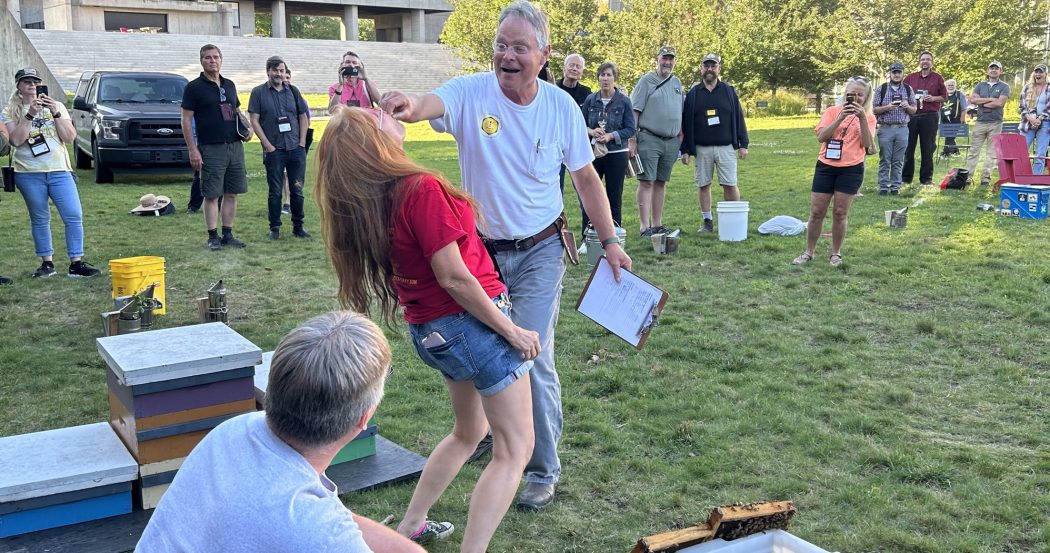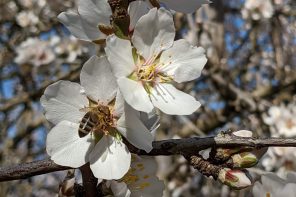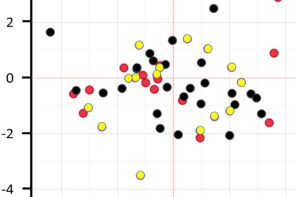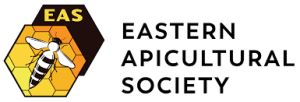 The Eastern Apicultural Society’s Annual Conference
The Eastern Apicultural Society’s Annual Conference
By: David Burns
In my years as a beekeeper, I’ve attended quite a few conferences. But there’s one that has always managed to stand out in a special way. It was back in 2009 that I attended my first EAS conference in pursuit of becoming an EAS certified master beekeeper, and I’ve been going back for more ever since. I’ve often found myself pondering what exactly makes EAS such a draw for me and other beekeepers. This year, over 500 beekeepers attended the conference. Why is it that so many of us are drawn to the EAS conferences year after year?
This year, I flew out to the university of Massachusetts in Amherst to attend the 68th EAS conference. Eastern Apicultural Society of North America, Inc. (EAS) stands as a beacon of education and research. Established in 1955, EAS has grown into the largest, noncommercial beekeeping organization in the United States and a global hub for beekeeping enthusiasts. With a commitment to excellence in bee research and the education of beekeepers, EAS continues to hold an annual conference that serves as a cornerstone event for beekeepers from around the world.
This year’s theme was, “The Past, Present and Beeyond.” It was remarkable how the campus architect reflected this same “journey through time” theme with its brutalist and dystopian architectural design in many buildings.
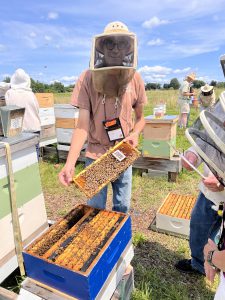
Field Test
Master Beekeeper Certification: Nurturing Expertise
What originally drew me to attend my first EAS conference was my desire to become an EAS certified master beekeeper. In addition to education and research, EAS is renowned for its master beekeeper certification program. The EAS Master Beekeeper Program stands as a testament to EAS’s commitment to excellence and is the grandfather of all master beekeeper programs. The MB program was started by Dr. Roger Morse at Cornell in 1981 and now EAS oversees the testing of all EAS master beekeeper candidates. It is a rigorous two days of testing. Candidates must attain a minimum score of 85 to pass the lab, written, oral and field tests. Once certified, EAS MBs become pillars of support for the educational arm of EAS, contributing to the growth and enrichment of the beekeeping community.
What’s the draw for beekeepers? For me, it’s more than the informative lectures and workshops. It’s the unique opportunities for beekeepers to dive deeper into demonstrations, hands-on experiences and evening social events with friends. In fact, at my first EAS in New York, I was in a microscopy workshop examining Nosema spores and met for the first time, Dr. Jon Zawislak. We’ve become lifelong friends, having met at EAS. I’ve also made so many other lifelong friends from EAS. Every year I attend, I make more friends and connections with beekeepers around the country, even around the world.
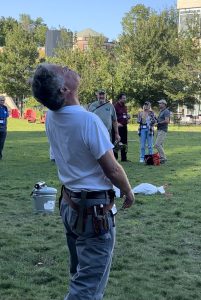
Paul Kelly Drone Spitting
Another reason I keep going back is because once you become an EAS MB, they put you to work teaching. The Short Course, Monday through Tuesday, is a key component of the conference designed for beginners and intermediate beekeepers. This year, I spoke several times during the short course, as MBs are asked to conduct these workshops. Here, beekeepers can explore topics ranging from fundamental beekeeping techniques to specialized skills like queen grafting, disease detection and more.
The Main Conference, extending from Wednesday to Friday, features keynote presentations that set the tone for each day’s proceedings. This year’s keynote speakers were Dr. Tammy Horn-Potter, Dr. Samuel Ramsey and Dr. Judy-Wu Smart. Multiple tracks of presentations ensure that attendees can delve into their areas of interest, whether that’s the latest in honey bee research, innovative beekeeping practices, or the art of apitherapy, candle making and more.
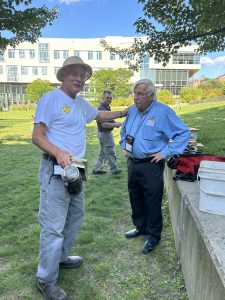
Paul Kelly and Ken Warchol discussing pans for the smoker contest (one of the five contests in the Beekeeper Olympics)
Cultivating Creativity: Beyond the Hive
The EAS conference goes beyond the confines of traditional beekeeping to explore the creative and diverse aspects of the craft. Workshops on honey show judging, honey bee photography and cooking with honey celebrate the artistry and flavors of beekeeping.
A unique and whimsical highlight of the conference is the Bee Olympics, where beekeepers showcase their skills in unconventional contests. One standout challenge involves spitting a drone from one’s mouth to measure how far it can travel – a playful yet engaging way to test participants’ bee-related talents. So, start practicing now for 2024! By the way, you can’t kill a drone during the contest.
A Revered Guest: Rev. Lorenzo Langstroth
At an evening barbeque event, there was a special appearance by Rev. Lorenzo Langstroth as played by Marc Hoffman, adding a special historical touch. Reverend Langstroth, often hailed as the “Father of American Beekeeping,” revolutionized beekeeping with his invention of the movable frame hive. His presence serves as a reminder of the rich legacy and innovation that continues to shape modern beekeeping practices.
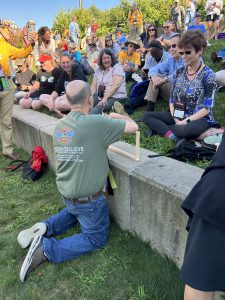
Frame Building Olympics
Scholarship and Success: Celebrating Achievement
EAS’s dedication to cultivating talent extends beyond certification of MBs to awards and scholarships. Yearly awards include the James I. Hambleton Memorial Award, the Roger A. Morse Outstanding Teaching Award, the Divelbliss Award, the EAS Student Apiculture Award and the Mann Lake EAS Master Beekeeper Scholarship Award. EAS desires to celebrate achievements by supporting those who are sure to enhance beekeeping in the future.
I had an opportunity to have lunch with the 2023 recipient of the Mann Lake EAS Master Beekeeper Scholarship award, Kyle Day from Missouri. For such a young man, Kyle has it all together in beekeeping. Kyle’s participation in workshops, events, and networking opportunities at the conference embodies the true spirit of EAS.

Drone Spitting
Additionally, the recognition of Ayeah Gideon Gobti from Cameroon, the international winner of the 2017 scholarship, highlights the global reach and impact of EAS’s initiatives. Gobti was unable to travel to the U.S. until this year and his attendance showcases the enduring influence of EAS’s support, fostering connections and growth that transcends borders.
A Beacon for Beekeeping: EAS’s Lasting Impact
As the annual conference at the University of Massachusetts in Amherst came to a close, the legacy of the Eastern Apicultural Society continues to reverberate. The event not only celebrates the intricate world of bees but also champions the spirit of learning, collaboration and community.
With its unwavering dedication to education, research and excellence, EAS stands as a beacon, illuminating the path forward for beekeepers, researchers and enthusiasts alike. As beekeeping evolves, EAS remains at the forefront, nurturing the passion and knowledge that sustain both the bees and those who care for them.






